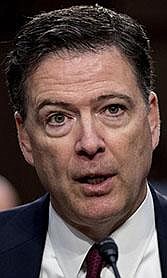WASHINGTON -- A bipartisan Senate report released Tuesday affirms the U.S. intelligence community's conclusions that Russia interfered in the 2016 presidential election in a campaign approved by Russian President Vladimir Putin and aimed at helping Donald Trump win the White House.
The report rejects Trump's claims that the intelligence community was biased against him when it concluded that Russia had interfered on his behalf in the election. It says instead that intelligence officials had specific information that Russia preferred Trump in the election, that it sought to denigrate Democratic opponent Hillary Clinton, and that Putin had "approved and directed aspects" of the Kremlin's influence campaign.
The redacted report from the Senate Intelligence Committee is part of the panel's more than three-year investigation into Russian interference. Intelligence agencies concluded in January 2017 that Russians had engaged in cyber-espionage and distributed messages through Russian-controlled propaganda outlets to undermine public faith in the democratic process, hurt Clinton and aid Trump, who ultimately became president.
Trump has questioned the assessment, which was also endorsed by former special counsel Robert Mueller in his report last year. Mueller concluded that Russian interference was "sweeping and systematic," but he did not allege a criminal conspiracy between Russia and the Trump campaign.
Senate Intelligence Committee Chairman Richard Burr, R-N.C., said in a statement that his panel "found no reason to dispute" the intelligence community's conclusions, saying they reflected strong tradecraft and analytical reasoning.
One of the intelligence committee assessment's most important conclusions "was that Russia's aggressive interference efforts should be considered 'the new normal,'" Burr said.
"That warning has been borne out by the events of the last three years, as Russia and its imitators increasingly use information warfare to sow societal chaos and discord. With the 2020 presidential election approaching, it's more important than ever that we remain vigilant against the threat of interference from hostile foreign actors," Burr said.
EVIDENCE ASSESSMENT
The Senate report calls the agencies' assessment an "impressive accomplishment" and endorses its core conclusions that Russia had interfered on a grand scale in the election and that Putin directed the interference.
"The Committee found that specific intelligence as well as open source assessments support the assessment that President Putin approved and directed aspects of this influence campaign," the Senate report states.
The panel said it found that the intelligence community had presented sufficient information to support its conclusion that Russia had developed a preference for Trump over Clinton in the election. The report says intelligence officials "consistently" told the committee in interviews that they were under no political pressure to reach their conclusions.
The Senate investigation also delved into an internal debate at the time about how and whether to incorporate into the intelligence community assessment details from a dossier of research from a former British spy, Christopher Steele, that the FBI relied on as it sought warrants to eavesdrop on a former Trump campaign aide.
Officials eventually decided to include the information as a two-page annex to the most classified version of the assessment. The Senate says the information from Steele was not used in the body of the assessment or to "support any of its analytic judgments."
Former FBI Director James Comey said in response to questioning from Burr: "I insisted that we bring it to the party, and I was agnostic as to whether it was footnoted in the document itself, put as an annex."
FBI officials told the Senate committee in interviews that they "would have had a major problem if Annex A had not been included," according to the report. The FBI, the report says, believed they "had to put everything in."
Then-FBI assistant director for the Counterintelligence Division, E.W. "Bill" Priestap, told the committee that the bureau "didn't want to stand behind" the Steele report, but because then-President Barack Obama had directed the agencies to include all information on Russian interference in the 2016 election, the bureau felt it "would have had a major problem" if it had not been cited in some way.
The dossier has come under additional scrutiny within the last week, as newly declassified footnotes from a Justice Department inspector general report raise the prospect that Russian disinformation made its way into the research files.
While largely praising the assessment, the Senate report does say it could have done a better job of looking at previous election interference. It says the agencies presented a clear argument that such meddling was unprecedented, but did not adequately analyze interference from the 2008 and 2012 presidential elections, as it says Obama had asked them to do.
In their report, senators essentially said they had asked the same questions that federal prosecutor John Durham is now examining and found that the intelligence agencies' work stood up, even if it was conducted in a compressed time frame to be finished before Obama left office in January 2017.
'CASE IS CLOSED'
"The case is closed," said Sen. Angus King, I-Maine. "I don't know how you could have a much more credible source than a three-year study by a bipartisan committee that came to a unanimous conclusion."
The committee's top Democrat, Virginia Sen. Mark Warner, said in a statement that the agencies' assessment represents "the kind of unbiased and professional work we expect and require from the intelligence community." Warner said the country should not be caught unprepared again.
"The ICA [intelligence committee assessment] correctly found the Russians interfered in our 2016 election to hurt Secretary Clinton and help the candidacy of Donald Trump," Warner said. "Our review of the highly classified ICA and underlying intelligence found that this and other conclusions were well-supported."
Another Democrat on the panel, Oregon Sen. Ron Wyden, added his comments in a statement at the end of the report. He said the committee's work makes clear that the intelligence community's findings on Russian interference are "not a 'hoax'" just because Putin denies it.
"Russian interference in the 2016 election is a fact, and Donald Trump's deference to Putin only serves to further Russian disinformation and undermine efforts to defend the United States against ongoing attacks," Wyden wrote.
However, Fred Fleitz, a former CIA officer who briefly served in the Trump administration, dismissed it as "a whitewash." Many Republicans believe that the intelligence agencies overstated Russia's support for Trump and argue that Moscow was trying to sow chaos in the United States, not support any one candidate.
The final report comes almost two years after the panel first released its findings agreeing with the intelligence community's 2017 conclusions. Its release was delayed as intelligence agencies reviewed it for declassification, and much of it remains redacted. To write the report, the committee reviewed thousands of pages of documents and conducted interviews with intelligence officials.
This is the fourth of five reports that the Senate panel will release on the subject. Previous investigations reviewed Russian efforts to breach state election systems and manipulate social media, and made recommendations to prevent more interference in the future. Another examined the mistakes of the Obama administration as Russia interfered.
The committee's fifth, and final, report will examine counterintelligence findings, including whether Trump's campaign conspired with Russia. It's unclear when that will be released.
Information for this article was contributed by Mary Clare Jalonick and Eric Tucker of The Associated Press; by Ellen Nakashima of The Washington Post; and by Nicholas Fandos and Julian E. Barnes of The New York Times.
A Section on 04/22/2020


